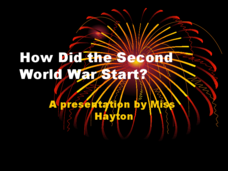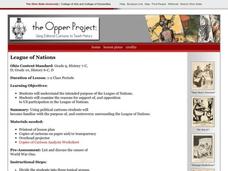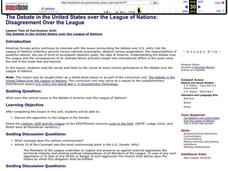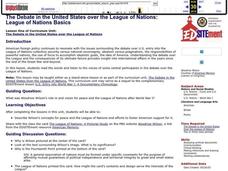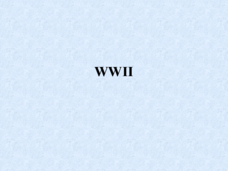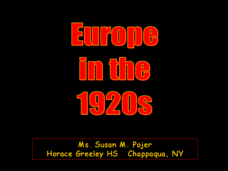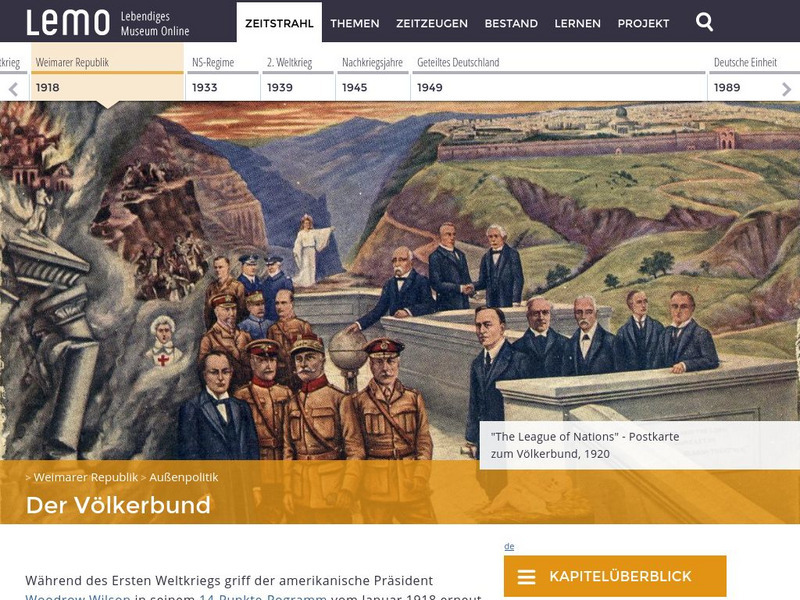Franklin D. Roosevelt Presidential Library & Museum
Role Playing Relating to Big Decisions
While most high schoolers are too young to vote, they still need to learn the skills needed to solve problems. The ninth resource in a 10-part civics series presents class members with four "What Would You Do?" scenarios that have them...
DocsTeach
Analyzing Woodrow Wilson's Fourteen Points
The end of a war means the causes were resolved, right? Not for World War I. By examining Woodrow Wilson's Fourteen Points, budding historians consider imperialism, nationalism, militarism, and alliances, as well as Wilson's efforts to...
Stanford University
League of Nations
An interesting lesson explores the Treaty of Versailles and the creation of the League of Nations to prevent further large scale warfare in World War I. A presentation explains how the United States Congress reacted to the offer to join...
Theodore Roosevelt Association
Defining America's Role in the World
As the first American president to win the Nobel Peace Prize, and only one of four presidents to do so in United States history, Theodore Roosevelt's foreign policy achievements and preservation of peace are often overshadowed by his...
Curated OER
How Did WWII Start?
How did the second world war begin? A presentation first looks at the political climate that led to WWI and the effects of that war. Then, it describes the reason Hitler was able to take hold of Germany after WWI and prior to WWII. The...
Curated OER
League of Nations
What is the League of Nations, when did it begin, and what is it's purpose? Young political minds can explore the answers to these questions through political cartoon analysis. Included are several political cartoons, an analysis...
Curated OER
The Debate in the United States over the League of Nations: Disagreement Over the League
High schoolers examine the opposition of the US Senate to Woodrow Wilson's idea of a League of Nations. They discuss the central ideas involved in the debate over the League.
Curated OER
The Debate in the United States over the League of Nations: League of Nations Basics
Students examine Woodrow Wilson's ideas for peace and the League of Nations. They examine how he garnered supported of it by looking at images and discussing their context.
Curated OER
The Debate in the United States over the League of Nations
Students investigate Woodrow Wilson's ideas for peace through the League of Nations. They examine how he attempted to encourage American support for the League and the opposition to it that was found in the Senate.
Curated OER
New Nations, New Problems: 1914-1922
Take a moment between your World War I and World War II units for this presentation, which focuses on the territorial implications and changes after the end of World War I. Your class will appreciate the radical loss of land and power of...
Curated OER
WWII
As a review of information learned about Word War II, this would be a great resource. In a format using pictures, diagrams and lists of information, the presentation provides a look at the key topics. Both visually attractive and...
Curated OER
End of Mandates and the Middle East
Ninth graders investigate the original mandates of the League of Nations regarding the Middle East. They listen to a lecture/PowerPoint presentation on the end of the mandate system, and complete a fill-in-the-blank worksheet that...
Curated OER
League of Nations
Ninth graders examine the purposes and mandate system of the League of Nations. They watch a PowerPoint presentation on the mandate system and complete a fill-in-the-blank worksheet, and participate in a "pick your side" activity.
National Endowment for the Humanities
The Debate in the United States over the League of Nations: Five Camps: From Voices of Consent to Voices of Dissent
Learners explore and discuss Woodrow Wilson's concepts for peace and the League of Nations. They understand efforts made to foster American support for the League and discuss the opposition shown in the Senate.
Curated OER
Europe in the 1920s
Delicately poised after the dramatic end of WWI and the startling beginning of WWII, this presentation encompassing the positions and roles of Germany, Italy, England, France, and the League of Nations in the 1920's. The first half of...
Curated OER
Nation Building
Ninth graders examine the role of the United States in nation building. For this World History activity, 9th graders evaluate the role of the United States in building nations in other parts of the world.
National First Ladies' Library
Forming a League of Nations
High schoolers identify and research the original language as composed by Woodrow Wilson in his League of Nations. Then they identify and describe the revisions of the original League of Nations as the United Nations was created....
Curated OER
Assessment: Causes of the Second World War
In this causes of World War II assessment worksheet, students respond to 10 graphic organizer and essay questions regarding appeasement, the League of Nations, and World War I.
Curated OER
Lost Peace
Pupils view a television program that chronicles the failure of the League of Nations as a deterrent to further war. They create a timeline of events that led from WWI to WWII and hold a mock town meeting in which they discuss the pros...
Curated OER
The Debate in the United States over the League of Nations
Eleventh graders read the words and listen to the voices of some central participants in the debate over the League of Nations.
Curated OER
The Debate in the United States over the League of Nations: Disagreement Over the League
Students read the words and listen to the voices of some central participants in the debate over the League of Nations.
American Rhetoric
American Rhetoric: Woodrow Wilson: The League of Nations
This is the text of Woodrow Wilson's speech explaining the content and purpose of The League of Nations.
Other
Le Mo: 1918 1933 Der Volkerbund
Brief overview from LeMO of the founding and history of the League of Nations, which was formed as a consequence of the Treaty of Versailles, which officially ended World War I.






